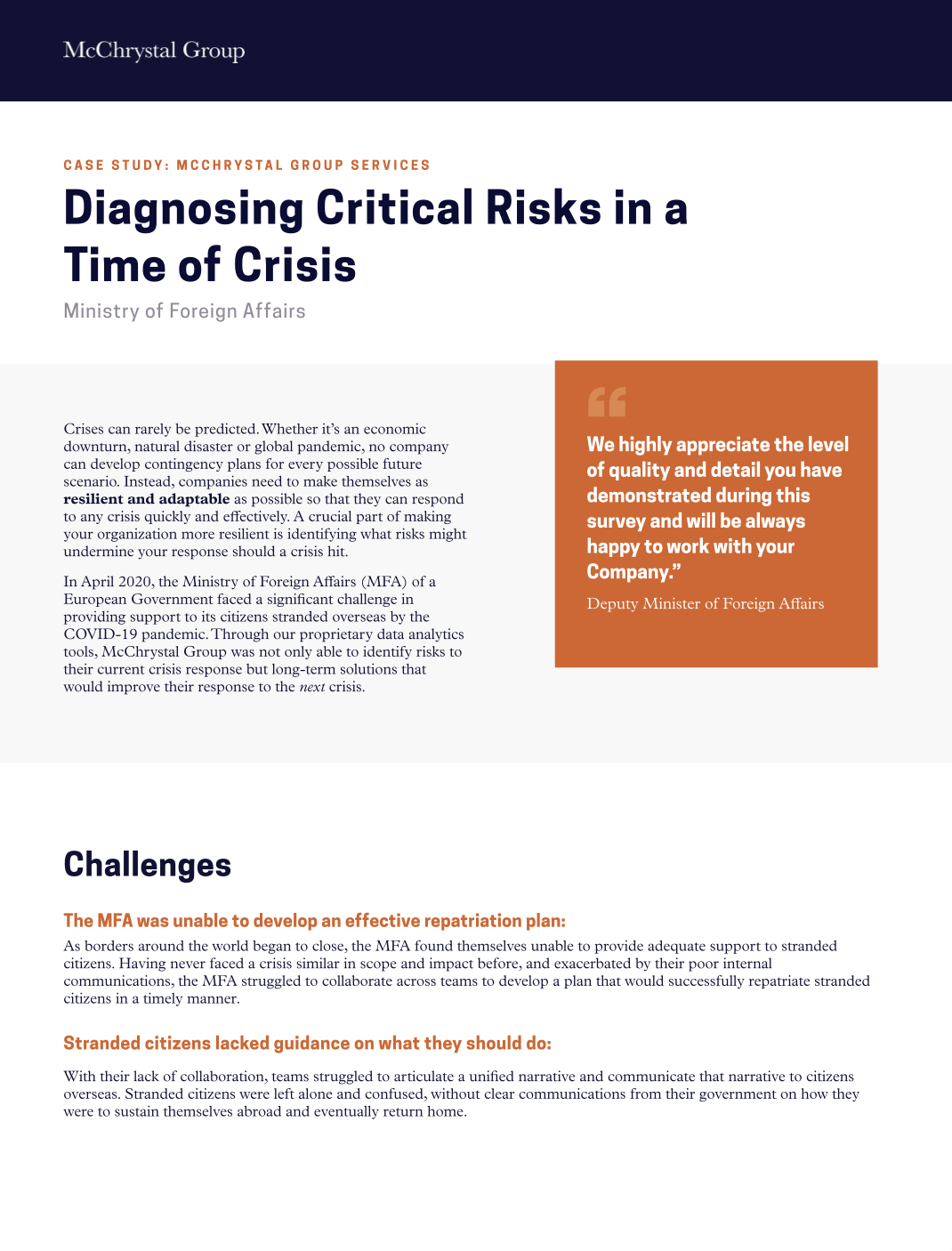Crises can rarely be predicted. Whether it’s an economic downturn, natural disaster or global pandemic, no company can develop contingency plans for every possible future scenario. Instead, companies need to make themselves as resilient and adaptable as possible so that they can respond to any crisis quickly and effectively. A crucial part of making your organization more resilient is identifying what risks might undermine your response should a crisis hit.
In April 2020, the Ministry of Foreign Affairs (MFA) of a European Government faced a significant challenge in providing support to its citizens stranded overseas by the COVID-19 pandemic. Through our proprietary data analytics tools, McChrystal Group was not only able to identify risks to their current crisis response but long-term solutions that would improve their response to the next crisis.
Challenges
The MFA was unable to develop an effective repatriation plan:
As borders around the world began to close, the MFA found themselves unable to provide adequate support to stranded citizens. Having never faced a crisis similar in scope and impact before, and exacerbated by their poor internal communications, the MFA struggled to collaborate across teams to develop a plan that would successfully repatriate stranded citizens in a timely manner.
Stranded citizens lacked guidance on what they should do:
With their lack of collaboration, teams struggled to articulate a unified narrative and communicate that narrative to citizens overseas. Stranded citizens were left alone and confused, without clear communications from their government on how they were to sustain themselves abroad and eventually return home.
Solutions
McChrystal Group’s European Office designed and delivered a virtual survey between 28 and 30 April 2020 to rapidly identify the risks that were undermining the MFA’s efforts to address the crisis. The Pulse was designed to leverage key employees, and provide the MFA’s leadership with rapid and actionable information on the efficacy of their COVID-19 response.
Rapid Survey Deployment:
A Critical Risk Pulse survey was designed and deployed in only a few days. Survey responses from 422 employees, both locally and in Embassies overseas, were collected over a 58 hour period.
Analysis and Recommendations:
Within two weeks of the Critical Risk Pulse’s launch, McChrystal Group had analyzed all the data and was able to provide actionable insights to the MFA. Our team not only identified actions that would significantly speed up the repatriation process but also actions that would improve internal communications, ensuring that the MFA would be able to respond better to future crises.
Impact
Development of a new internal operating rhythm:
McChrystal Group recommended an enhanced and more regular internal communications cadence that allowed for more effective information-sharing within the MFA, greater collaboration across teams, and faster decision-making. With a new internal communications framework in place, teams were able to work together to devise a successful repatriation process.
New channels of communication identified:
McChrystal Group identified new communications channels and methods that would allow the MFA to contact their citizens trapped overseas. For example, we recommended the establishment of an FAQ webpage on the government website, enhanced use of social media and recorded videos for public Q&A sessions. This helped to alleviate concerns and fear among stranded citizens, and gave them the required instructions that would enable their cooperation in the repatriation process.
Prioritization of key information:
While the MFA was not deliberately holding back information from their citizens overseas, their lack of a unified narrative meant that front-line workers were unable to prioritize what information needed to be shared. Using the Pulse data, we were able to identify what crucial information had to be shared to speed up the repatriation process, for example, real-time flight scheduling and clear instructions on the ticket booking process.





